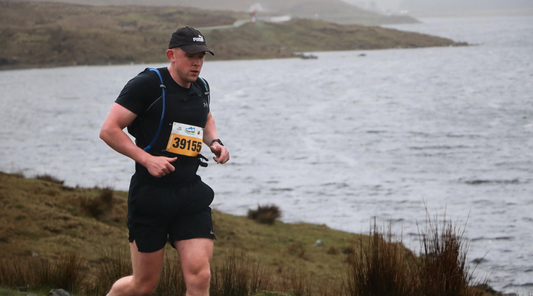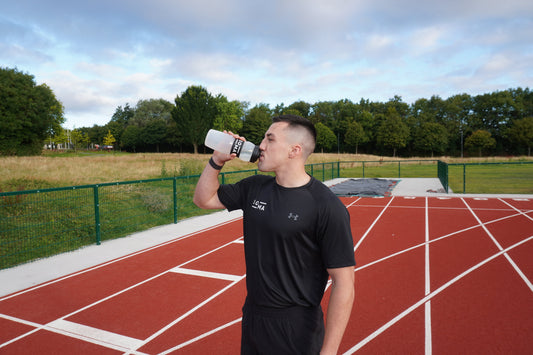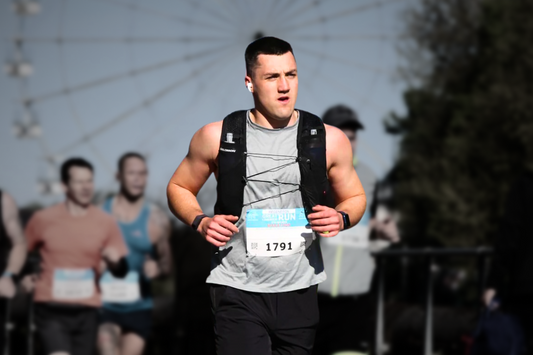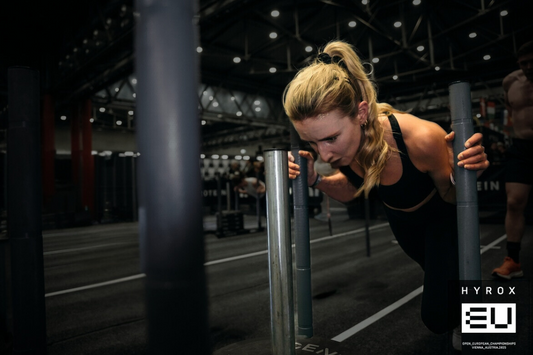Proper hydration is crucial for marathon performance, influencing everything from muscle function to cognitive abilities. However, knowing how much, when, and what to drink during a marathon is essential to maintaining peak performance. This detailed guide will provide a research-backed, scientifically grounded hydration strategy, focusing on water, electrolytes, and timing, ensuring you're set up for success on race day.
The Role of Hydration in Marathon Performance
Hydration impacts several critical physiological processes that can affect marathon performance:
- Thermoregulation: Adequate fluid intake allows for proper sweating and heat dissipation. Without it, the body struggles to regulate its core temperature, increasing the risk of heat exhaustion or heat stroke during longer races.
- Cardiovascular Function: Dehydration increases the viscosity of blood, causing the heart to pump harder to circulate blood. This results in elevated heart rates and reduced cardiovascular efficiency.
- Muscle Function: Sodium and potassium are essential for muscle contraction. Dehydration combined with an imbalance in electrolytes can lead to cramps, fatigue, and impaired performance.
- Cognitive Function: Dehydration negatively impacts decision-making, concentration, and overall mental clarity. This is particularly important for maintaining pacing and making fueling decisions during the later stages of a marathon.
Pre-Race Hydration Strategy
Hydration should begin well before race day. The aim is to optimise hydration status in the days leading up to the marathon.
Daily Fluid Intake in the 24-48 Hours Before Race Day
- Fluid Intake: Aim to consume 2.5-4 liters of fluids per day in the 48 hours leading up to the race. This helps ensure that you're fully hydrated without overloading your system.
- Electrolyte Balance: To complement your water intake, you should aim for 500-1000mg of sodium and 150-200mg of potassium per litre of fluid, incorporating electrolyte drinks to maintain fluid balance. The exact numbers will vary depending on your individual sweat rate and sodium concentration in your sweat. A 4:1 sodium-to-potassium ratio in your electrolyte drink is ideal, as this more accurately reflects the sodium and potassium levels found in sweat.
- Avoid Overhydration: Consuming excessive amounts of water without electrolytes can dilute blood sodium levels, leading to hyponatremia - a dangerous condition characterised by low sodium levels in the blood. Avoid excessive fluid consumption, particularly in the hours immediately preceding the race.
- Caffeine: If you drink coffee or caffeinated beverages, continue to do so but be aware of the diuretic effects of caffeine. It's advisable not to increase caffeine intake drastically in the days before the race as it can have unpredictable effects on hydration.
Morning of the Race
- Water Intake: Aim to consume 500-1000ml of water in the 2 hours before the race. This ensures you're adequately hydrated without overloading your bladder.
- Electrolyte Drink: In addition to water, consume 500-1000mg of sodium and 150-250mg of potassium. This will help maintain electrolyte levels and ensure fluid balance.
- Consideration for Hot Weather or Heavy Sweating: If the weather is expected to be hot or if you’re a heavy sweater, increase your pre-race fluid intake. You might need 1-2 litres of water and a sodium content closer to the 1000-1500mg mark.
Hydration During the Marathon
Hydration strategies during the marathon should be dynamic and adaptable to changing conditions, such as weather and race course logistics. There are two main scenarios to consider during the race: one where you're using a water bladder, and one where you rely on aid stations.
Scenario 1: Using a Water Bladder
If you're carrying a water bladder, you have more control over how much and when you drink. This allows for consistent hydration without relying on aid stations.
- Water: Aim to drink 150-200ml every 15-20 minutes. This can help you maintain a steady hydration level throughout the race, without consuming too much at once, which can lead to bloating or discomfort.
- Electrolytes: Since water alone won't provide the necessary electrolytes, mix your electrolyte powder with the water in your bladder. Aim for about 600-1000mg of sodium per hour and 150-250mg of potassium per hour. This should be balanced based on your sweat rate and sodium loss, which may increase in hot or humid conditions.
- Adjusting for Heat or Heavy Sweating: If you know you're sweating heavily or running in high temperatures, increase your sodium intake above 1000mg of sodium per hour. Increase your fluid intake above 800ml per hour to ensure you're compensating for higher fluid losses.
Scenario 2: Relying on Aid Stations
While aid stations typically provide water, and sometimes electrolyte drinks, you may need to supplement with your own products to ensure you maintain balance.
- Water Stations: Drink 150-250ml of water at each water station, generally spaced roughly every 5-10km along the course. Depending on your sweat rate, aim to drink at least 4-6 times throughout the race.
- Electrolytes: If the aid stations provide electrolyte drinks, make sure to consume these. Otherwise, plan to have someone hand you your electrolyte drink, either at certain points or as needed. Aim for 600-1000mg of sodium per hour and 150-250mg of potassium per hour.
- Adjusting for Heat: As in Scenario 1, if it’s hot, increase your fluid and sodium intake to the higher end of the ranges, or above.
General Guidelines
- Test in Training: It’s crucial to experiment with your hydration strategy during training. Everyone is different, and your needs will depend on your sweat rate, temperature, and overall fitness level. Find the electrolyte and fluid balance that works best for you.
- Don’t Wait Until You’re Thirsty: By the time you feel thirsty, dehydration may already be setting in. Follow a predetermined hydration schedule to prevent performance loss.
Post-Race Hydration
After the marathon, it's crucial to continue hydrating to replace lost fluids and electrolytes.
- Immediate Rehydration: Within 30 minutes of finishing, drink 500-750ml of water with 500-800mg of sodium and 150-200mg of potassium. This will help begin the recovery process and rehydrate you effectively.
- Rehydrate Throughout the Day: Continue to drink water and electrolyte drinks throughout the day. Aim to consume at least 1.5-2 liters of fluids post-race, alongside a balanced meal with carbohydrates and protein for muscle recovery.
Final Thoughts
Hydration is a dynamic and individualised aspect of marathon racing. Your hydration needs will depend on factors like your sweat rate, the temperature on race day, and your personal preferences. By following the guidelines in this detailed hydration strategy and adjusting based on personal experience in training, you can maintain peak performance during your marathon.
Best of luck!





